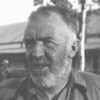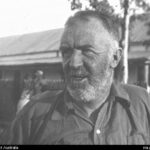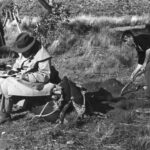Charles Duguid was born on 6th April 1884 at Saltcoats, Ayrshire, Scotland, the son of primary school headmaster Charles Duguid and his wife Jane (née Kinnier). He studied medicine at Glasgow University, where he was also the champion half-miler, his red hair earning him the nickname ‘The Scarlet Runner’. His early medical work in the Glasgow slums developed in him a compassion for the underdog which continued throughout his 102-year life.
A shipboard romance (he was the ship’s surgeon) on a voyage to Australia in 1911 led to his marrying an Australian girl, Irene Young, on 23rd October 1912. After practising in rural Victoria for two years, he then settled in Adelaide and during World War I served as a surgeon with a Light Horse regiment in Egypt. His wife died suddenly in 1927, leaving him with a 13-year old son.
On 18th December 1930 Dr. Duguid married Phyllis Lade, senior English mistress at the Presbyterian Girls’ College, and they had two children. Both Duguid and his wife were idealists and humanitarians, and they were shocked by newspaper reports of cruelties and atrocities inflicted on Aborigines by white men in outback Australia. The Duguids’ joint concern and work for Aborigines became a crusade. Warned that he would lose friends and patients if he continued to champion the Aboriginal cause, Dr. Duguid defied his critics, intensified his efforts and travelled for many months in the outback at his own expense to see for himself what was happening.
In 1935 he was appointed moderator of the Presbyterian Church in South Australia. Most Presbyterians seemed proud of his idealism and backed him in founding the Ernabella Mission in Central Australia, one of the most successful ventures of its kind in Australian history. Increasingly, people in high places began to listen to him. He was the inaugural president of the Federal Council for Aboriginal Advancement, a member of the Aborigines’ Protection Board in South Australia and a life member of the S.A. Aborigines’ Advancement League.
In 1947 Dr. Duguid made international headlines when he resigned from the Aborigines’ Protection Board in protest against the willingness of his fellow members to allow the Woomera Rocket Range to be established on part of the Central Australian Aboriginal Reserve. In due course, his influence on the thinking of two state premiers, Labor’s Don Dunstan and Liberal’s David Tonkin, led to the formation of the Aboriginal Lands Trust of South Australia and to the unprecedented return to the Pitjantjatjara people of their ancient tribal lands in the north of the state.
Dr. Duguid wrote several books, including No Dying Race (1963) and Doctor and the Aborigines (1972). In a foreword to the latter, his friend Sir Mark Oliphant wrote: ‘This compassionate medical man must know in his heart that he has done more for the Aborigines of his adopted country than any other person, living or dead.’ Dr. Andrew Duguid has written of his father: ‘Some of my main impressions are of his energy, drive, self-confidence and sometimes intolerance of those he considered wrong. Above all, his vitality. He believed intensely in the essential dignity and equality of all men and women.’ Dr. Duguid continued to practise as a surgeon until he was 72. In 1971 he was created O.B.E.
In the early 1980s the elders of the Pitjantjatjara tribe, who called Dr. Duguid ‘Tjilpi’ (‘Old Man Father’), announced that they wanted him to be buried at Ernabella ‘so that Aborigines will always remember that he was one of us and that he faithfully helped us’. Dr. Duguid, much moved, responded: ‘I have never been paid a greater compliment. I am happy and grateful to do what you decide and stay among you.’ So, after his death on 5th December 1986, his body was flown to Ernabella and buried among his Aboriginal friends.







Comments
2 responses to “Charles Duguid, OBE”
Please consider adding “and his wife” to the following:
“backed him” and his wife “in founding the Ernabella Mission…”
I think that it is important to give some emphasis to the co-operation of spouse in working on ventures.
I do note that it is said earlier “The Duguids’ joint concern…”
I appreciated the biographical article. Some points in particular:
“champion half-miler” -“The Scarlet Runner”. {Appeal to young people who read this …as well.}
Relationship with wives.
“defied his critics, intensified…”
“Presbyterians seemed proud..”
“protest…allow Woomera Rocket Range…”
“led to the formation of the Aboriginal Lands Trust…unprecedented return …of… tribal lands”
Quote from Sir Mark Oliphant
and his son Dr Andrew..
Pitjantjatjara elders wanted him to be buried at Ernabella.
GOOD if added that wife was buried there too.
Thanks Alexander,
You make an important point. We’ll flag it with the author before making changes, but I think we should be able to do so.